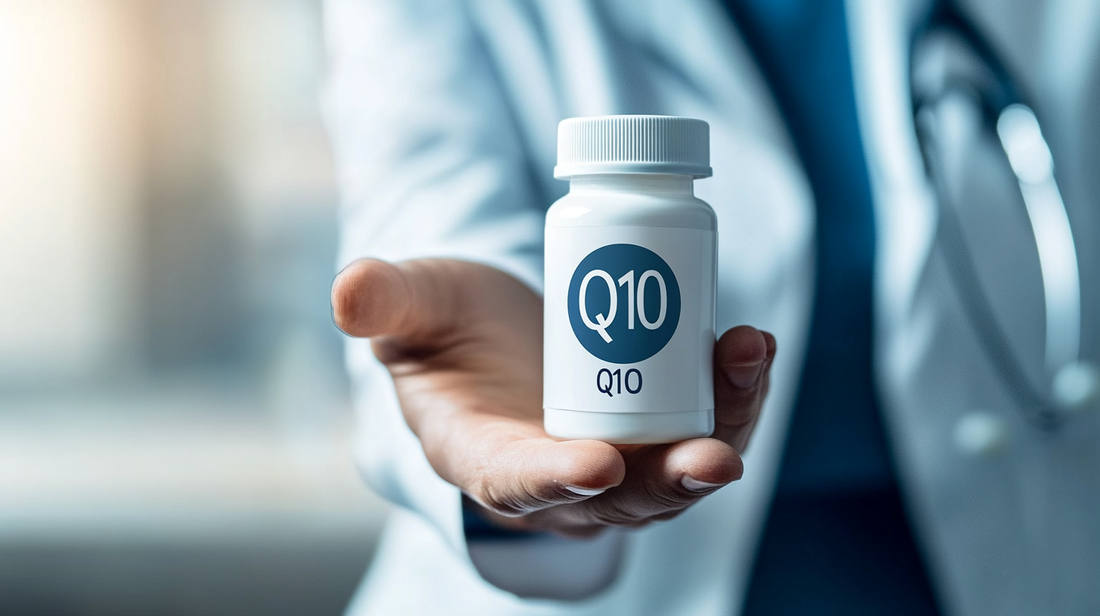Coenzyme Q10 (CoQ10) is a powerful antioxidant that plays a crucial role in maintaining optimal health. Although it naturally exists in the body, many people find they need a little extra support, especially as they age or manage specific health conditions. In this comprehensive guide, we'll delve into what CoQ10 is, its numerous health benefits, where to find it, how to take it, and whether it's safe to use as a supplement.
What is CoQ10?
CoQ10, also known as ubiquinone, is a naturally occurring antioxidant found in every cell of the human body. It plays a key role in the production of energy within the mitochondria, the "powerhouses" of cells. As the body’s energy currency, CoQ10 is involved in producing adenosine triphosphate (ATP), which powers nearly every biological process, from muscle contractions to nerve signaling.
CoQ10 is also a powerful antioxidant, helping to neutralize harmful free radicals that can damage cells and lead to aging and disease. The concentration of CoQ10 is highest in organs that require the most energy, such as the heart, kidneys, liver, and muscles.
While CoQ10 is naturally synthesized by the body, its production tends to decline with age, which is why supplementation may become important for many adults. It’s also essential for overall cellular health and has been associated with numerous health benefits.
Health Benefits of CoQ10
1. Supports Heart Health
One of the most well-known benefits of CoQ10 is its positive impact on heart health. CoQ10 is essential for maintaining a healthy cardiovascular system. It helps to reduce oxidative stress, lower blood pressure, and enhance blood vessel function, which may contribute to a healthier heart.
Several studies suggest that CoQ10 may help reduce the risk of heart disease by improving the health of the blood vessels and heart muscles, potentially reducing symptoms of heart failure. CoQ10 supplementation has also been linked to improved cholesterol levels, which is vital for heart health.
2. Boosts Energy Levels
CoQ10 plays a critical role in the production of ATP, the primary energy molecule used by the body’s cells. By enhancing cellular energy production, CoQ10 can improve energy levels and reduce feelings of fatigue. This is especially helpful for individuals experiencing chronic fatigue or those recovering from illness.
CoQ10 has been used by athletes and fitness enthusiasts to boost physical performance and reduce muscle fatigue. Some studies suggest that CoQ10 supplementation may improve exercise performance by reducing oxidative damage and enhancing energy production during physical activity.
3. Powerful Antioxidant Properties
As a potent antioxidant, CoQ10 helps to neutralize free radicals that can cause cellular damage and accelerate the aging process. Free radicals are unstable molecules that can damage cells, proteins, and DNA. This oxidative damage has been linked to the development of chronic diseases such as cancer, diabetes, and neurodegenerative disorders like Alzheimer's disease.
By counteracting oxidative stress, CoQ10 helps to protect the body against cellular damage, support overall immune function, and potentially reduce the risk of certain diseases.
4. Enhances Brain Health
CoQ10 may also play an important role in supporting brain health. Since the brain is highly energy-dependent, adequate CoQ10 levels are essential for maintaining cognitive function. Research suggests that CoQ10 may help protect the brain from oxidative damage, support cognitive function, and even improve memory. It is particularly beneficial for individuals with neurodegenerative diseases such as Parkinson’s disease.
Additionally, CoQ10 has been investigated for its role in supporting mood and mental clarity, with some studies suggesting that it may help reduce symptoms of depression and anxiety.
5. Supports Skin Health
CoQ10 is also widely used in skincare products due to its ability to protect the skin from damage caused by free radicals. CoQ10 helps to neutralize oxidative stress, which can contribute to the formation of wrinkles, fine lines, and age spots.
Studies have shown that CoQ10 can improve skin elasticity, reduce the appearance of wrinkles, and promote skin regeneration. By reducing oxidative stress and supporting cellular repair, CoQ10 helps to maintain a youthful and radiant complexion.
6. May Help with Migraines
Migraines can be debilitating, but CoQ10 has shown promise as a natural remedy for reducing their frequency and severity. Some studies suggest that CoQ10 supplementation can help prevent migraines by improving mitochondrial function and reducing oxidative stress in the brain. For individuals who experience frequent migraines, CoQ10 may serve as a valuable preventive supplement.
7. Aids in Exercise Performance
In addition to boosting energy levels, CoQ10 has been shown to enhance exercise performance. By improving cellular energy production, CoQ10 can help reduce fatigue, improve endurance, and enhance recovery after intense physical activity.
Some research suggests that CoQ10 supplementation may also reduce muscle damage and soreness following strenuous exercise. This makes it a popular supplement among athletes and fitness enthusiasts who want to optimize their performance and recover more quickly from workouts.

Sources of CoQ10
While CoQ10 is produced naturally by the body, there are also several external sources of this powerful antioxidant. These sources include both food and supplements.
Natural Food Sources
CoQ10 can be found in various foods, particularly in those that are rich in healthy fats. Some of the best dietary sources of CoQ10 include:
· Fatty Fish – Salmon, sardines, and tuna are excellent sources of CoQ10.
· Organ Meats – Beef and pork liver, heart, and kidneys are some of the most concentrated sources of CoQ10.
· Nuts and Seeds – Peanuts, pistachios, and sesame seeds are good plant-based sources.
· Vegetables – Spinach, broccoli, and cauliflower contain small amounts of CoQ10.
While you can obtain CoQ10 from food, the concentration is generally low. For those who need higher levels of CoQ10, supplementation may be the most effective option.
CoQ10 Supplements
CoQ10 supplements are available in various forms, including Ubiquinone (the oxidized form) and Ubiquinol (the reduced, more bioavailable form). The body absorbs Ubiquinol more efficiently, especially as we age, so this form is often recommended for older adults.
CoQ10 supplements come in various dosages, ranging from 30 mg to 300 mg per serving. Consult with a healthcare provider to determine the most appropriate dosage based on your specific health needs.
How to Take CoQ10
Recommended Dosage
The typical dosage for CoQ10 supplementation ranges from 100 mg to 300 mg per day. However, the ideal dosage depends on individual health conditions. For example, people with heart disease or those taking medications to lower cholesterol may require higher doses.
Best Time to Take CoQ10
CoQ10 is fat-soluble, meaning it is best absorbed when taken with a meal that contains healthy fats. Taking CoQ10 with food ensures that it is adequately absorbed by the body.
Forms of CoQ10
CoQ10 supplements are available in various forms, including softgels, capsules, and powders. The most common and convenient forms are softgels and capsules, which are easy to swallow. Some people prefer CoQ10 powder, which can be mixed into smoothies or drinks.
Is CoQ10 Safe?
CoQ10 is generally considered safe for most people when taken in recommended dosages. However, like any supplement, there may be side effects and potential interactions with medications.
Potential Side Effects
Most people tolerate CoQ10 well, but some individuals may experience mild side effects, such as nausea, headaches, or digestive discomfort. These side effects are typically temporary and subside with continued use.
Who Should Avoid CoQ10?
· People on Blood-Thinning Medications – CoQ10 may interact with anticoagulants like warfarin, potentially reducing their effectiveness. If you're taking blood thinners, consult your doctor before using CoQ10.
· Pregnant or Breastfeeding Women – There is limited information about the safety of CoQ10 during pregnancy and breastfeeding, so it's best to consult with a healthcare provider.
Possible Interactions with Medications
CoQ10 may interact with certain medications, including blood pressure medications, diabetes medications, and chemotherapy drugs. If you are on any of these medications, consult a healthcare professional before adding CoQ10 to your regimen.
Conclusion
CoQ10 is a versatile and beneficial supplement that supports heart health, boosts energy levels, and protects the body from oxidative stress. While it is found in foods, supplementation can provide a higher concentration for those who need it. CoQ10’s broad range of benefits—from enhancing brain health to reducing the frequency of migraines—makes it a valuable addition to a healthy lifestyle. As with any supplement, it’s important to consult with a healthcare provider to ensure that CoQ10 is safe and appropriate for your needs.
References
l "Coenzyme Q10." National Institutes of Health: Office of Dietary Supplements, U.S. Department of Health & Human Services, 2021.
l "The Role of Coenzyme Q10 in the Prevention of Cardiovascular Disease." American Journal of Cardiology, vol. 94, no. 7, 2012, pp. 843–847.
l Bhagavan, H.N., and M. Chopra. "Coenzyme Q10: Absorption, Tissue Uptake, Metabolism, and Pharmacokinetics." Free Radical Research, vol. 39, no. 5, 2005, pp. 313-322.


